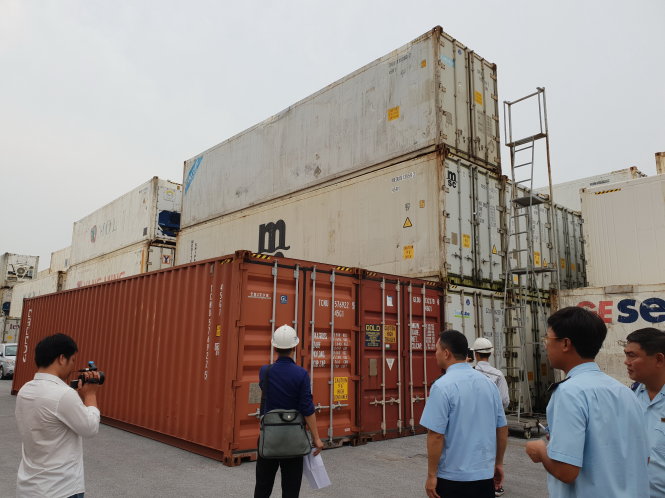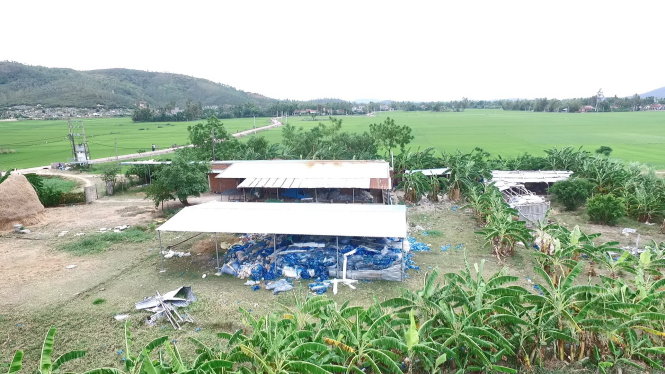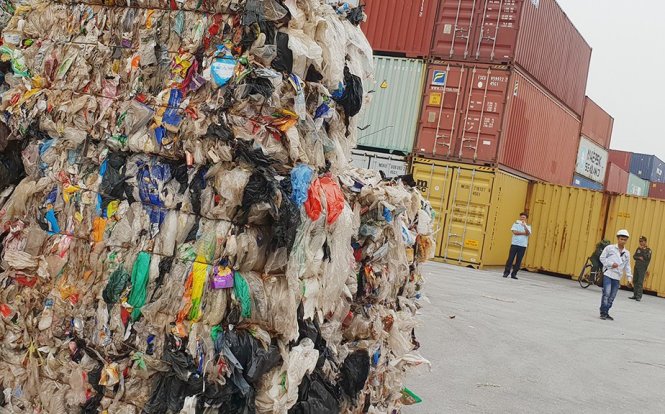Healthy return on investment has prompted many in Vietnam to venture into the business of importing scraps from other countries and reselling them to local recyclers, a practice that defies effective bans while leaving great costs to the environment.
In August, Tuoi Tre (Youth) newspaper’s investigative journalists got in touch with Lanh, a pseudo name to protect subject’s identity, a ‘wholesaler’ of scraps in Ho Chi Minh City, to learn how the business works.
“I don’t bother with deals that earn me less than VND30 million [US$1,300] in profit per container of scraps,” Lanh told us about his first rule of the trade.
“My friends in the plastic resin production industry make no less than VND100 million [$4,300] from each container,” he added.
According to the magnate, demand for plastic scraps as a recycling material in Vietnam is huge while not enough companies are licensed to import scraps, which gave rise to people like him who conducted the business in the shadow.
Lanh ‘formalize’ his shipments by renting, or borrowing, import licenses from other companies that act as his legal cover.
The license rent used to cost around VND1-2 million [$43-86] per container but has since early 2018 risen to VND4-5 million [$172-216] due to increased risks as a result of tightened control by Vietnamese customs.
 |
| Customs officers inspect an unclaimed container of scraps at the IDC Nam Hai seaport in Hai Phong Province in northern Vietnam. Photo: Tuoi Tre |
A crackdown in June has left around 80 of Lanh’s containers, loaded with approximately $560,000 worth of scraps, remain stuck at the Cat Lai Port in Ho Chi Minh City without clearance for import.
According to Dr. Phung Chi Sy, an expert in recycling, around 95-98 percent of plastic scraps that are qualified for import can be recycled into plastic resins, which is sold for VND15,000-30,000 ($0.65-1.30) per kilogram.
This means a full container of plastic scraps can yield VND300-500 million ($13,000-21,500) after recycling, a huge revenue for something considered trash.
The Tuoi Tre journalists found no evidence to suggest that those running this kind of business had received a commission from foreign parties to take in the ‘trash’ and have it disposed of in Vietnam, as suspected by some members of the public after learning about the abandoned containers of scraps held up by at local seaports.
A gold mine
While importing and recycling plastic scraps is a hugely profitable business, the real gold mine is found inside thrown-away electronic components, which is banned from import into Vietnam.
Up to 250 grams of gold can be extracted from a metric ton of computers’ mainboards after chemical treatment, according to studies done by U.S. materials technology company Umicore N.V.
In comparison, the same volume of rocks and ores from a gold mine must be processed to get only five grams of gold, or 50 times less.
Similarly, experts estimate that by recycling one million smartphones, they can extract 24 kilograms of gold, 250 kilograms of silver, nine kilograms of palladium and more than nine tons of copper.
But everything comes at a cost.
 |
| A makeshift metal extraction facility in Phu Yen Province in south-central Vietnam. Photo: Tuoi Tre |
According to Dr. Do Thanh Bai, an expert in chemistry, the extraction of precious metals such as gold, silver, copper and palladium from electronic components requires the use of extremely strong acids.
“This chemical extraction process not only creates a dangerous working environment but also leads to pollution of air and water resources,” Bai explained.
“Wastewater from such treatment contains chromium and cadmium – chemical elements known for their cancer-causing properties. For small or makeshift extraction facilities, there’s no feasible way to thoroughly treat contaminated water,” he added.
Despite an effective ban on imports of used electronic devices, many have found ways to get around the law by grinding the components into small pieces and mix them with regular scraps.
When such action is discovered, violators are often only slapped with an administrative fine for ‘importing sub-standard scraps’ since there are not enough grounds to charge them with deliberately importing used electronic components, according to a custom officer in Ho Chi Minh City.
Like us on Facebook or follow us on Twitter to get the latest news about Vietnam!























































